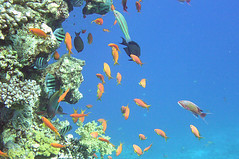
“Not for 55m years has there been oceanic disruption of comparable severity”
IN 1998 a rise in sea temperatures caused by El Niño, a periodic eastward surge of warm Pacific water, caused a mass bleaching of the world’s coral reefs, the permanent or temporary home of perhaps a quarter of all marine species. Up to 90% of the Indian Ocean’s technicoloured reefs turned to skeletal wastes, largely devoid of life. Had this happened to rainforests—coral’s terrestrial equivalent—a sea-change in attitudes to the environment could have been expected. But because this change occurred in the sea, the calamity drew remarkably little comment.
Traditional attitudes towards the sea, as something immutable and distant to humanity, are hugely out of date. The temperature change that harmed the corals was not caused by human activity; yet it was a foretaste of what man is now doing to the sea. The effects of overfishing, agricultural pollution and anthropogenic climate change, acting in concert, are devastating marine ecosystems. Though corals are returning to many reefs, there is a fair chance that in just a few decades they will all be destroyed, as ocean temperatures rise owing to global warming. The industrial pollution that is cooking the climate could also cause another problem: carbon dioxide, absorbed by the sea from the atmosphere, turns to carbonic acid, which is a threat to coral, mussels, oysters and any creature with a shell of calcium carbonate.
The enormity of the sea’s troubles, and their implications for mankind, are mind-boggling.
via The Economist








